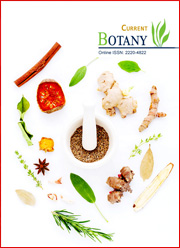Impact of juice factory spent wash on the growth and pigment content of Lablab purpures Sweet. (L.)
Abstract
Juice factory spent wash effluent discharged as wastewater, contains various toxic chemicals that contaminate water and soil. It may affect the common crops if it is used for agricultural irrigation. Toxic nature of juice factory effluent is due to the presence of high amounts of organic and inorganic chemical loads and its high acidic in nature. The paper deals with the effects of untreated juice factory spent wash, on growth and pigments content of Lablab purpures Sweet. (L.). The Lablab purpures Sweet. (L.) is a commonly used legume crop in Tamil Nadu. Seeds were selected and surface-sterilized with 0.1% HgCl2 for 2 minutes and washed with distilled water thoroughly. They were treated with different concentrations (5-100%) of effluent. The germination percentage growth (shoot and root length), fresh weight, dry weight and pigment content of the plants were investigated. The results revealed that the germination characters, root and shoot length, fresh and dry weight and pigment content increased upto 5% concentration and there after decline in higher concentrations of spent wash effluent.





 .
.